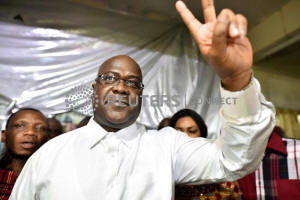|
Congo ruling coalition wins legislative
majority, constraining president-elect
 Send a link to a friend
Send a link to a friend
 [January 12, 2019]
By Stanis Bujakera [January 12, 2019]
By Stanis Bujakera
KINSHASA (Reuters) - Outgoing Democratic
Republic of Congo President Joseph Kabila's ruling coalition won a
majority in legislative elections, a coalition official said on
Saturday, despite opposition leader Felix Tshisekedi's win in the
presidential vote the same day.
The result will undercut Tshisekedi's ability to deliver on campaign
promises to make a break with the 18-year Kabila era and fuel suspicion
that his victory, announced on Thursday, came through a backroom deal
that will preserve Kabila's influence over important ministries and the
security forces.
Kabila is due to step down in the coming days after 18 years in power,
in what was meant to be Congo's first democratic transfer of power in 59
years of independence. But he has signaled he intends to remain involved
in politics and might run for president in 2023 when term limits no
longer apply.
Lawyers for the runner-up in the presidential election, Martin Fayulu,
were on their way to Congo's highest court on Saturday to file a fraud
complaint.

Fayulu says he won in a landslide with more than 60 percent of votes,
and accuses Tshisekedi of striking a deal with Kabila to be declared the
winner.
Late in the morning, about 50 Republican Guard soldiers and police
officers surrounded his residence, sending dozens of his supporters, who
had been chanting against Kabila and Tshisekedi, fleeing inside, a
Reuters witness said.
Tshisekedi's camp denies that there was any deal with Kabila and says
meetings it held with the president's representatives after the election
were meant solely to ensure a peaceful transfer of power.
LITTLE ROOM FOR MANEUVER
Either way, the parliamentary majority retained by the handful of
parties in Kabila's coalition will curtail Tshisekedi's room for
maneuver. Under the constitution, the majority enjoys significant powers
and the president must appoint his prime minister from its ranks.
The prime minister, in turn, must countersign presidential orders
appointing or dismissing military chiefs, judges and heads of
state-owned enterprises.
[to top of second column]
|

Felix Tshisekedi, leader of the Congolese main opposition party, the
Union for Democracy and Social Progress, gestures to supporters at
party headquarters in Kinshasa, Democratic Republic of Congo,
January 10, 2019. REUTERS/Olivia Acland/File Photo

Adam Chalwe, a national secretary for Kabila's PPRD party, the
biggest within the FCC coalition, told Reuters that results from the
individual races announced by the electoral commission (CENI) early
Saturday morning showed FCC candidates taking more than 300 out of
500 seats in the National Assembly.
Reuters was not immediately able to confirm that independently.
Parties in the FCC coalition accounted for about 350 seats in the
previous legislature.
The coalition's presidential candidate in the Dec. 30 election,
Emmanuel Ramazani Shadary, finished a distant third with 24 percent
of the vote. Pre-election polling had shown the FCC lagging behind
opposition parties in legislative races.
In a tweet on Saturday, Fayulu wrote that CENI's results "were
invented out of whole cloth. I demand a hand recount of all votes
for the three elections (presidential, national legislative and
provincial)".
The disputed outcome threatens to reawaken violence in the huge and
tumultuous central African country where millions have died during
civil wars since the 1990s.
Security forces killed dozens who protested at Kabila's refusal to
step down when his official mandate expired in 2016, and militia
violence rose across the country as armed groups moved to fill a
perceived power vacuum.
(Additional reporting and writing by Aaron Ross, Editing by Ros
Russell/Mark Heinrich)
[© 2019 Thomson Reuters. All rights
reserved.]
Copyright 2019 Reuters. All rights reserved. This material may not be published,
broadcast, rewritten or redistributed.
Thompson Reuters is solely responsible for this content.
 |